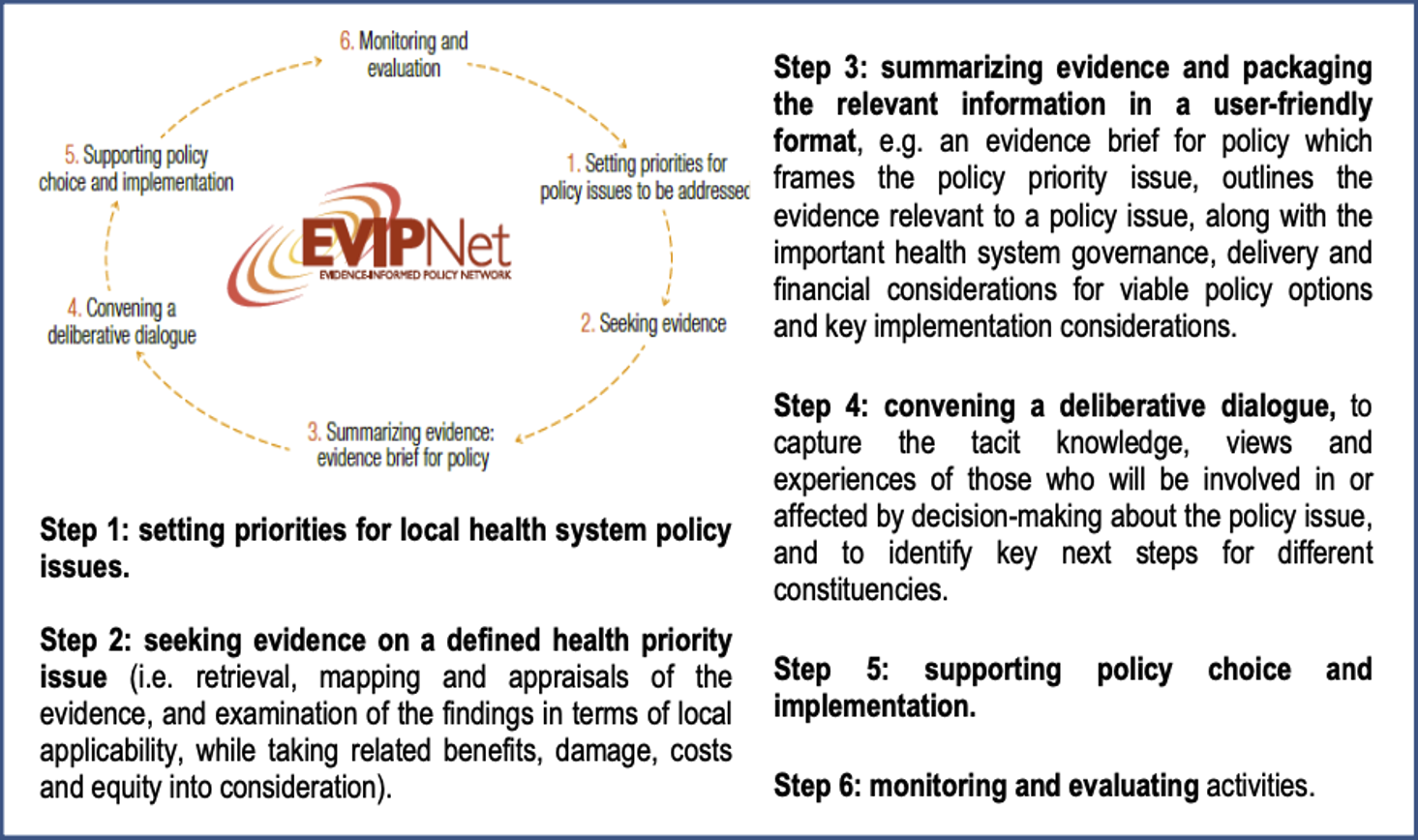
EVIPNet Q&A
1. What is EVIPNet?
The Evidence-informed Policy Network (or EVIPNet) is a WHO initiative embracing cutting-edge approaches to knowledge translation for better policy-making in health. It was launched in 2005 as a response to a World Health Assembly resolution (WHA58.34) and promotes the systematic use of health research evidence in policy-making with a focus on low- and middle-income countries. (1)
2. What is EVIPNet’s mission?
EVIPNet's mission is to strengthen health systems and improve health outcomes by:
- developing a network of partnerships at national, regional, and global levels among health system policymakers and other stakeholders.
- institutionalizing mechanisms for research uptake in policymaking through the
- establishment of national advisory bodies, called knowledge translation platforms (KTPs).
- building capacity to enable countries to access, assess, adapt, and use research evidence in health policymaking and implementation.
- fostering a culture of collaboration and mutual learning between policy-makers, researchers, and other stakeholders.
3. Why is evidence-informed policy-making important?
4. What is knowledge translation?
WHO defines knowledge translation (KT) as "the synthesis, exchange and application of knowledge by relevant stakeholders to accelerate the benefits of global and local innovation in strengthening health systems and improving people’s health" (9). KT is a process leading to a cycle of:
- policy-informed evidence, in which policy priorities are being taken into consideration when producing, assessing, and synthesising evidence; and
- evidence-informed policy, in which the best available evidence is incorporated into policy-making (10).
5. What is a knowledge translation platform?
A knowledge translation platform (KTP) is a national advisory body that forms the fundamental unit of EVIPNet at country level. It is an organization or network consisting of health system policy-makers, health system managers, researchers, and civil society, which aims to:
- improve the culture and practice of research evidence creation, adaptation, and use.
- influence processes supporting the prioritization of timely and relevant research evidence.
- package and disseminate research evidence relevant to health policies.
- convene national dialogues about priority health challenges and policy options.
- enhance national capacity to find and use research evidence for health policies; and
- catalyse KT at the national and global levels.
6. What is the EVIPNet action cycle?
Many national advisory bodies/knowledge translation platforms throughout the world implement an EVIPNet action cycle to foster evidence-informed policy-making :

7. Where does EVIPNet operate?
EVIPNet’s Secretariat is based at the WHO headquarters in Geneva, Switzerland, with representation from WHO Regional Offices in sub-Saharan Africa, the Americas, Asia, the eastern Mediterranean and Europe (11). National EVIPNet teams operate in various countries across these regions.
8. How does EVIPNet work?
EVIPNet has a networked governance structure operating on three distinct, yet closely interconnected, levels:
- Global - EVIPNet’s Secretariat within WHO Science Division provides global leadership, contributes to coordinating efforts, develops norms & standards, provides technical assistance and additional networking supports to countries and regions.
- Regional - at the regional level, EVIPNet supports countries with capacity building, and fosters the routine exchange of experiences and emerging practices among country teams.
- National - individual country teams are the fundamental units of EVIPNet that drive the E2P work. At the country level, national advisory bodies/KTPs plan and implement KT activities adapted to the local context.
9. Why is networking important in EVIPNet?
10. What are the benefits of EVIPNet being a WHO initiative?
WHO is responsible for providing leadership on global health matters, shaping the health research agenda, setting norms and standards, articulating evidence-based policy options, providing technical support to countries, and monitoring and assessing health trends. WHO has long-standing expertise in knowledge translation (KT), is widely trusted for its technical and scientific expertise and normative function and has access to the highest levels of decision-making within national ministries of health. WHO has conferred legitimacy and convening power to EVIPNet's members at national and global levels. By establishing EVIPNet, WHO has been at the forefront of networking in KT, building capacity, sharing experience, and developing new methodologies and approaches to KT. EVIPNet provides a wealth of lessons learned and success stories gathered from national advisory bodies/KTPs all around the world and from well-tested KT tools and methodologies.
11. What emerging areas is EVIPNet working on?
Among other initiatives, some of the emerging topics EVIPNet is working on, include:
- Supporting EIDM institutionalization.
- Citizen engagement in evidence-informed policy-making.
- Learning health systems approach to improve implementation, scale-up and sustainment of evidence-informed health interventions.
- EIDM tools repository to facilitate exploration of the latest WHO tools and best practices for knowledge translation and evidence-informed decision-making.
References
- WHO resolution WHA58.34: ministerial summit on health research. Geneva: World Health Organization; 2005
- Oxman AD, Lavis JN, Fretheim A. The use of evidence in WHO recommendations. Lancet 2007; 369:1883–9.
- Lavis JN, Davies HTO, Oxman A, Denis JL, Golden-Biddle K, Ferlie E. Towards systematic reviews that inform healthcare management and policymaking. J Health Serv Res Pol 2005; 10:35–48.
- Innvaer S, Vist G, Trommald M, Oxman A. Health policy-makers' perceptions of their use of evidence: a systematic review. J Health Serv Res Pol 2002; 7:239–44.
- Lavis JN, Ross SE, Hurley JE, Hohenadel JM, Stoddart GL, Woodward CA et al. Examining the role of health services research in public policymaking. Milbank Quart 2002; 80:125–54.
- United Nations. The millennium development goals report. New York: United Nations; 2007
- EVIPNet global brochure [web site]. Geneva: World Health Organization; 2008
- Oxman AD, Lavis JN, Fretheim A: SUPPORT tools for evidence-informed health policymaking (STP) 1: what is evidence-informed policy-making? Health Res Pol Syst2009; 7(Suppl 1):S1.
- Ellen M. Knowledge translation framework for ageing and health. Geneva: Department of Ageing and Life-Course, World Health Organization, 2012
- Kasonde J, Campbell S. Creating a knowledge translation platform: nine lessons from the Zambia Forum for Health Research. Health Res Pol Syst 2012;10:31.
- Evidence-informed Policy Network (EVIPNet). Copenhagen: WHO Regional Office for Europe; 2013
- Creech H, Willard T. Strategic intentions: mapping knowledge networks for sustainable development. Manitoba: International Institute for Sustainable Development; 2001

